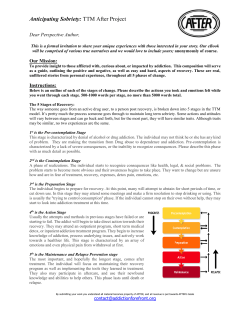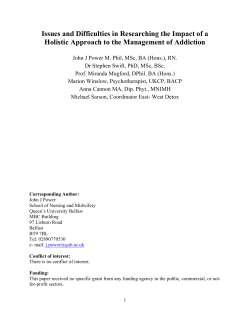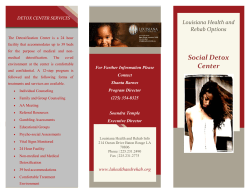
Finding help for a problem with tobacco, alcohol or
drugshelp.info Finding help for a problem with tobacco, alcohol or drugs The relationship between treatment activities and recovery from addiction |------------------------------------Start using drugs »¼ Get into trouble »¼ Timespan can be 10-40 years Stabilise the situation »¼ Pre-detox Detoxify ------------------------------------| »¼ Detox Early Abstinence »¼ Recovery Post-detox Schematic representation of addiction career, with the place of types treatment indicated Caution: the addiction career is not a straight line, but involves frequent relapse to drug use before recovery is established Addiction is an illness that can last years. Treatments can only be aimed at individual points on the career line, and last from minutes to months and years. They can be divided into three groups • ‘Pre-detox’ treatments are those aimed at people who are still using drugs. They consist of o activities aimed at reducing the damage that the drug use causes, such as, for example providing clean needles to reduce the spread of HIV o activities aimed at helping the person think about their drug use and encouraging them to move toward detoxification • ‘Detox’ treatments are aimed at helping the person remove the drug safely from his or her body. In advanced alcohol dependence or benzodiazepine dependence, the withdrawal syndromes are potentially fatal (This is not true in heroin withdrawal). • ‘Post-detox’ treatments are aimed at helping people who have stopped taking drugs to stay abstinent. Many agencies offer treatments from more than one group. 1215000000-080203. The information in this leaflet has been prepared and funded by Sure Care Solutions Ltd for drugshelp.info, and is for general informational purposes only. It does not constitute medical advice and is presented without any warranty as to the accuracy or completeness of the information. Please see our full terms and conditions on our website. ©RMCohen 2008 Page 1 of 2 drugshelp.info Finding help for a drug problem The process of accessing treatment There is no single point of entry to getting help for a tobacco, alcohol or drug problem. You can find information about what is available to residents of your borough by asking your local Primary Care Trust (PCT), who are responsible for commissioning health treatment services. You can find details of your local PCT by asking at your GP’s surgery, from your local library or Citizen’s Advice Bureau, or from the internet. You can go via your GP or you can approach a treatment service directly. Certain services will be funded by the PCT and therefore available as NHS treatments. This includes the local NHS smoking cessation service, possibly some treatment for alcohol, and treatment for drugs (usually heroin and cocaine), often including a street agency, a Community Drugs Team and a Drug Dependence Unit. Access to an inpatient detoxification unit may be available. The Home Office funds the Drug Intervention Programme, which offers access to addiction treatment for people coming into contact with the Criminal Justice System. The Home Office also co-ordinates the local Drug Action Teams, who advise the PCTs about what services are likely to meet the requirements of the Government’s 10-year Drug Strategy (Tackling Drugs to Build a Better Britain 1997). There are a number of private inpatient facilities which offer addiction treatment packages and a variety of rehabilitation facilities around the country. They can be approached directly by those with the funds to pay, and often the local NHS (for detoxification) or social services (for rehabilitation) are able to pay for those who do not have the funds, though budgets are limited and a community care assessment is required before social services will consider funding a place at a rehabilitation centre. It is also possible to access other community treatment in the private sector, such as psychotherapy, acupuncture, hypnosis. Private agencies can be found on a number of internet sites. You can seek suitable resources around the country by accessing the website of the National Treatment Agency for Substance Misuse (www.nta.nhs.uk) Because each treatment episode (which may last a matter of days or weeks) is only a small part of an addiction career and may need to be repeated after a relapse to drug use, you should weigh up the likely benefits very carefully before undertaking to fund a treatment episode for yourself or for a relative. Please bear in mind that private health insurance policies usually exclude treatment for an addiction from reimbursement. It is important to know that there is no agency which will take overall responsibility for your care and co-ordinate the components of treatment that will be most helpful for you both at any given time and in the long-term. 1215000000-080203. The information in this leaflet has been prepared and funded by Sure Care Solutions Ltd for drugshelp.info, and is for general informational purposes only. It does not constitute medical advice and is presented without any warranty as to the accuracy or completeness of the information. Please see our full terms and conditions on our website. ©RMCohen 2008 Page 2 of 2
© Copyright 2025





















